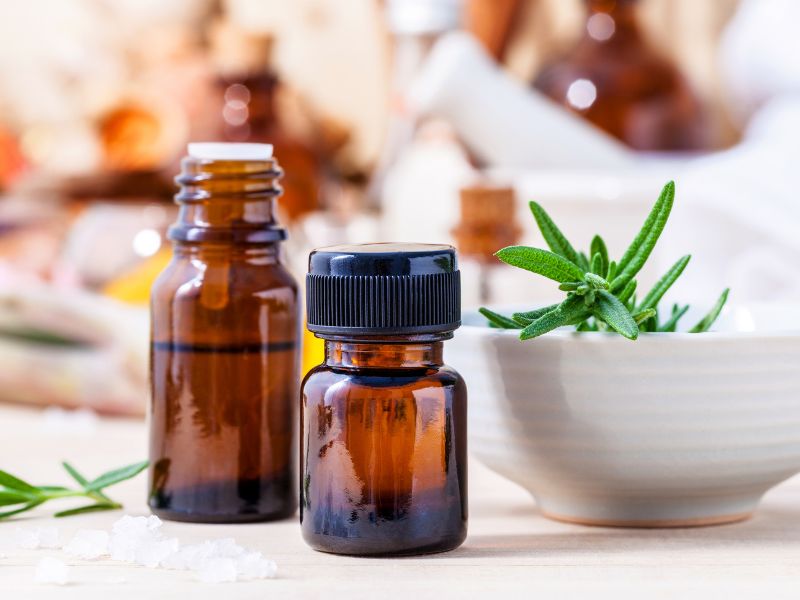Extend the benefits of your massage by facilitating detoxification with herbs and essential oils.
Bath
Herb teas and essential oils can be used in the bath for their healing and detoxifying properties. Start with five to eight drops in a full tub and do not exceed 15 drops of even the safest oils, such as lavender or geranium. If using peppermint, lemon or other citrus scented oil such as lemongrass, do not exceed three drops, as they can irritate skin.
Combining essential oils with vegetable oil before adding to the bath will reduce any irritation on sensitive skin. Epsom salts contain magnesium chloride, which helps to relax the muscles. Soak for 20 minutes. Using the same oils provided during your massage can trigger the same relaxation effect.
If you absolutely must be active after your massage, utilizing stimulating essential oils can help restore your vigor.
Post Massage Herbal Detox Tea
Combine one ounce of each-
- dandelion
- cleavers
- parsley
- linden
- peppermint
- ginger
Use one teaspoon per cup of boiling water, cover and steep for 5-15 minutes. Strain and drink.
Post Massage Muscle Relaxing Bath
Combine three ounces each –
- yarrow
- burdock
- calendula
- cramp bark
- black haw
For an herbal bath, use one cup of dried herbs per three quarts of water. Bring the water to a boil, remove from heat, add the herbs, cover and steep for at least 30 minutes. Strain the tea into the full tub of water.
Post Massage Essential Oil Bath Blends
Relaxation
4 drops lavender
2 drops chamomile
2 drops orange
Muscle Relief
5 drops marjoram
2 drops eucalyptus
1 drops lemongrass
Stimulating
5 drops rosemary
2 drops fir
1 drops peppermint
Add each 8-drop blend to one full tub of water. Stir, and soak for at least 20 minutes.
Herbal Suggestions for the Tub or Teacup
Lymphatic herbs
Cleavers: best lymphatic tonic, with alterative and diuretic properties; assists the detox process of swollen glands.
Calendula: anti-inflammatory herb helpful for a variety of skin complaints, including bruises and sprains; also supports detoxifying the lymph system.
Nervine herbs (calming effect)
Wild oat: The best nourishing nervine, it is specific for debility and exhaustion.
Chamomile: best known for calming insomnia, anxiety and as an anti-inflammatory.
Vervain- strengthens nervous system while relaxing stress and tension, antispasmodic.
Linden: soothing herb that has the unique ability to reduce cholesterol deposits and prevent build-up.
Passionflower: Sedative and pain relieving; the best choice for insomnia and neuralgia; antispasmodic
Detoxifying herbs
Burdock: Mild bitter stimulation encourages the liver and eliminative processes including digestive and kidney function.
Dandelion: effective diuretic with excess potassium providing an overall gain of this important nutrient.
Parsley: This overlooked culinary garnish is an effective diuretic and digestive aid; rich source of vitamin C.
Yarrow: Urinary antiseptic and diuretic that stimulates digestion and tones the vascular system.
Celery seed: Anti-rheumatic, diuretic and digestive herb reduces uric acid levels in the body and is helpful for arthritic conditions.
Muscle relieving herbs
Crampbark: Relaxes muscle tension and spasms; sedative and astringent.
Black haw: Antispasmodic and sedative useful in reducing blood pressure through relaxation of the peripheral blood vessels.
Ginger: Anti-inflammatory, warming and stimulating for peripheral circulation, sprains and fibrous muscle conditions; promotes elimination through perspiration.
Cayenne: Hot spice that blocks pain receptors; used to relieve everything from overworked muscles to arthritic complaints.
Mindy Green is a nationally recognized authority on botanicals and co-author of Aromatherapy, A Complete Guide to the Healing Art, 2009. Friend her on Facebook or see more at www.greenscentsations.com
>>To learn more about the benefits of using herbs and holistic nutrition as part of your health and wellness routine, click here for a schedule of accredited online holistic health classes and wellness programs from ACHS.
*Note: This information has not been reviewed by the FDA. This information has been provided for educational purposes only and is not intended to treat, diagnose, cure, or prevent disease. Before making any significant changes to your health routine, always consult with your primary care physician or naturopathic doctor.





